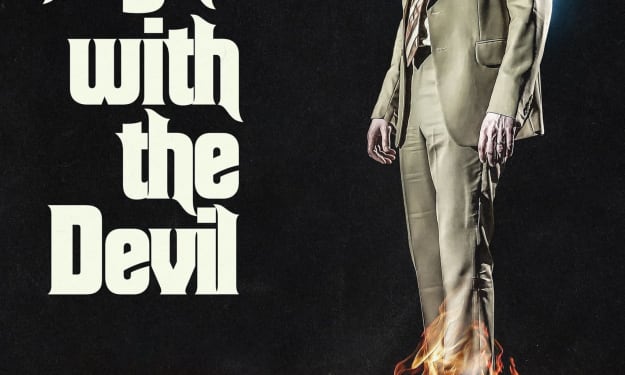
Did anyone else get shivers up their skin as they watched the popular TV show, You? If you have not seen this show, I suggest watching it, and then blowing your brains out with paranoia. The idea of You begins with a woman purchasing a book with a credit or debit card at a bookstore. Then, that innocent act tumbles out of proportions by a deranged man who thinks he is in love, but ends up destroying the girl's life. The chances of anyone having that happen to them are low. Like most people, I cannot name how many times I have used my card to pay for an item at the store. Until I saw You, I would of never second guessed the common act, or the act of giving out my name. I never realized what I could find out based on a name, until I began to proceed in some research.
I have a pretty common name, which I am aware is going to make the process of finding me a bit more difficult, but is it not impossible. My method was simple, I put my name into google. When the page loaded up, I was amazed to find that the third result had directly correlated with me. It was a page where I would post various articles in hope to earn some money. Lucky for me, this isn’t a site with much information. I scroll down to see what else I can find. Not that much further down, I found my Facebook profile. On my facebook, I see that it has a lot of information a random person access, including the region I live in and the date of my birthday, but I did not see anything else too penalizing. Looking further into the results, I was unable to find much else correlating to me. One minor thing found was a scholarship, another one was the obituary of my great grandma and a few other miscellaneous pieces of information. To look further into the information, I click the photos tab, finding no photos of me.
That’s good, I am safe, right? Further research would suggest no, but not based on what we put on social media, but based on the information we are forced to give to the government. Apparently, with only a name and knowing the area, as in state a person has lived in, I can find out more. Through public records, legal service is now provided online. I can find a person's age, possible relatives, police records, and surprisingly enough, their address. All for free. No wonder about every 3 in 10 people are ultimately stalked. The information is rather easy, and free to acquire. Its downfalls are high, yet it is a great mechanism that is often times used to stay safe. People tend to look up others, including the name of a person before a first date, or a potential babysitter or friend. The relevance of knowing everything about someone's history can equate to the behaviors they may have (How to Use the Internet).
Another piece of relevant information found on the internet is a person’s phone number. Have you ever been harassed or black mailed over text? I, unlike most people, would try to figure out who the culprit behind the messages is by looking up the number. With most numbers, unless it is a prepaid phone, there is a name attached to it, especially with companies like A&T and Verizon. Big companies may be one of the biggest criminals in the matter, and we do not even notice. Scrolling through facebook, a lot of times we will see an ad of something we had looked up previously. The internet tracks our browsing history on other websites, acquiring information on what we would be interested in buying. Odd enough, this is not all; they can track all mouse movements and typing. One big company can know all the internet activity that has been done (Matsakis).
In You, the main character, Joe Goldberg, did not do any sort of this in his internet search. Instead, he used a picture to get her address. Research shows this technology does not completely exist. However, every photo taken on a phone has an exif file. An exif file saves all information about the photo including when it was taken, and where. Social media sites, such as Facebook, erase this content upon upload. Yet, if I were to post on a site which did not wipe the exif files, that information could be valid to someone who wanted it and knew how to get it. Technology that allows the process of tracking down a photo will soon become readily available. Inventors in technology and security are actually looking into AI cameras that can recognize people's faces, and know who that person is. The idea is that they will help solve crimes by aiding in tracking people down. Yet, to be given such power, it obviously needs to be able to do the small things. This technology would mean the world to a stalker; they would be able to do less and have more. There are spyware and phone apps which allow a person to hide what they are doing. Any information they have could be hidden with an app, like a calculator, where you need a very specific code to access it. So if they are not caught in the action, with the odds being low, they could potentially never be. With these apps, you can find their GPS, their contact information, who they are texting, browsing history and their pictures and social media. They have basically everything in an average person's life, still wanting more. Once, a woman found a device in her pocketbook. It resembled a USB drive, but further inspection showed that it was a voice recorder that was slipped into her bag. The contact is not direct enough for her to figure out who placed it there. In my opinion, that would be scarier than anything (Lyons).
In You, Goldberg stands outside a young woman’s house to watch her. However, imagine the fear that would strike the audience if he had just hid a camera there. The social idea of him just standing there gives us heat for the main character. It allows us, as an audience, to question an act. One might question how Goldberg was able to get away with his crimes. Yet, one must also consider how easy is it to actually hide such an obsession, and still get information?






Comments
There are no comments for this story
Be the first to respond and start the conversation.